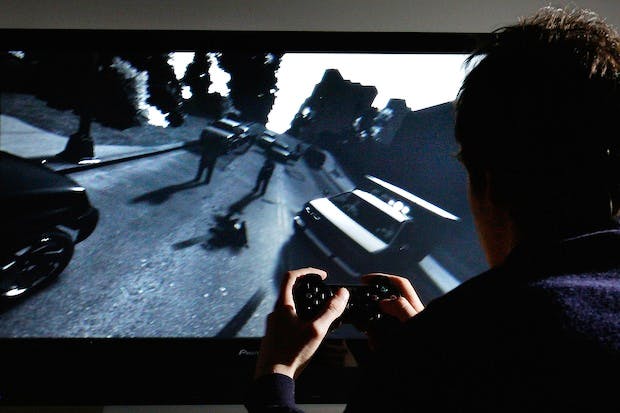It was about a week ago, at 8 p.m., when our blackout happened. In the 1980s people would have headed for the bedroom or out to loot the local off-licence. In 2013, however, our first reaction was to check the battery health of our mobile phones.
This relationship between sex, crime and consumer electronics may be important. The recorded fall in sexual activity among those aged 16 to 44 in the recent National Survey of Sexual Attitudes and Lifestyles was widely attributed to the ‘growth in social media’ and to our new habit of taking smartphones and tablets to bed. Plausible as this sounds, I don’t think the survey proves any such causation. It might be an effect of multi-channel television. Or perhaps the sequential adoption by women of Crocs, Ugg boots and the onesie during the period of the survey has led to a collective national detumescence.
Evidence to link falling crime rates and the growth of computer games, however, may be more significant. There is convincing data suggesting that computer games, even (or perhaps specifically) violent games such as Grand Theft Auto or Call of Duty, have brought about a fall in crime levels. Expert opinion differs mainly on the reasons why. The more sophisticated theories speak of people ‘rechannelling violent urges’ through game play. Others take a simpler approach: since these games occupy an enormous amount of a young male’s time, they keep him indoors and out of the way of places where crimes take place. These two explanations are not of course mutually exclusive.
Having been told for years that simulated violence must lead to violence in the real world, we may find these findings surprising. Perhaps we shouldn’t. After all, anthropologically speaking, most sports and games probably owe their evolutionary origins to a kind of damage limitation exercise. A codified form of competition which allows people to compete or settle differences — or simply let off steam — without both parties ending up seriously wounded or dead. And there’s no reason to believe more violent sports create more violent people. Rugby has long been described as ‘a game for hooligans played by gentlemen’. Perhaps Grand Theft Auto is much the same.
True, it would be better if young people were to occupy themselves in charitable works or macramé instead. But simulated violence is still a lot better than the real thing.
What fascinates me about such outcomes is that they almost never arise by design, but in the face of steadfast opposition. If you had gone to the government 20 years ago and proposed subsidising Rockstar Games to produce violent interactive content to reduce the crime rate, people would have said you were deranged; indeed the Daily Mail called for the first version of GTA to be banned. Yet — so far at least — the net effects may be beneficial.
How often do these utopian tendencies limit our approach to problem solving? Civilisation often advances by stumbling on less harmful alternatives to problems, rather than eradicating them completely. Yet we instinctively shy away from these ‘harm reduction’ approaches.
The approach to e-cigarettes illustrates this perfectly. Groups who should know better seem eager to ban them. The current criticism from the BMA (a kind of trade union for doctors) is that they ‘project the image of smoking’.
But, you damned fools, that’s exactly why they work. They work precisely because they simulate smoking. They feel a bit like smoking does. Patches and gum may substitute the drug, but they don’t substitute any of the habits or sensations of smoking any more than macramé substitutes the effect of a really good car chase. Sometimes the perfect is the enemy of the good.
Got something to add? Join the discussion and comment below.
Get 10 issues for just $10
Subscribe to The Spectator Australia today for the next 10 magazine issues, plus full online access, for just $10.















Comments
Don't miss out
Join the conversation with other Spectator Australia readers. Subscribe to leave a comment.
SUBSCRIBEAlready a subscriber? Log in